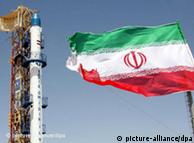 | World powers welcome new US attitude to Iran
Senior officials from six major powers have urged Iran to cooperate fully with the United Nations in the dispute over the country's nuclear programme. Delegates from the United States, Britain, France, China, Russia and Germany met for the first time since US President Barack Obama took office. In a joint statement, near the German city of Frankfurt, the parties welcomed an offer by Obama to talk directly with Tehran over its nuclear programme and also said the dispute should be resolved diplomatically. The parties said they would reconvene after the US had laid out its policies towards Iran. |  |  | Vatican issues ultimatum to Holocaust denier
The Vatican has demanded that British Bishop Richard Williamson retract statements on the Holocaust before being fully readmitted into the Roman Catholic Church. The Vatican also said in a statement that Pope Benedict XVI didn't know about Bishop Richard Williamson's views when he agreed to lift his excommunication on January 21. German Chancellor Angela Merkel on Monday urged the pontiff to make a clearer denunciation of Holocaust denials. Williamson told Swedish television that the Nazis killed 200,000 to 300,000 Jews, far fewer than the six million Jews historians accept. Williamson also denied the existence of gas chambers. Denying that the Holocaust took place is a criminal offence in Germany that carries a maximum five-year jail sentence. |  |  | Palestinian president addresses EU parliament
Palestinian President Mahmoud Abbas has renewed his appeal to the European Union to send peacekeepers to the Palestinian territories. Addressing the EU parliament is Strasburg, Abbas also asked for help organising presidential and legislative elections. The Palestinian president condemned Israel's recent offensive in the Gaza strip and called for a war crimes investigation, but added that he still sought a lasting peace accord with Israel. On the issue of Hamas, Abbas condemned the militant Islamic group's rocket attacks into southern Israel, but also said he remained committed to national reconciliation with the movement. |  |  | EU welcomes Obama's comments on protectionism
The European Union has responded favourably to US President Barack Obama's clear objection to protectionist language in his country's plans for economic recovery. The EU's top trade official, Catherine Ashton, said she was "encouraged" by Obama's comments. In a number of interviews for US television, Obama said a so-called “Buy American” clause in the stimulus bill risked provoking a trade war and would be a mistake. The 900-billion-dollar stimulus bill, which still needs the approval of the Senate, would require major public works projects to favour US suppliers over their foreign competitors. The European Union, Canada, Australia and Japan all expressed concern about the proposal. |  |  | Sri Lankan president says Tamil rebellion nearly crushed
Sri Lanka's president has said that Tamil Tiger rebels will be defeated by government forces within days, ending a 25-year-old insurgency. In a national day address, President Mahinda Rajapakse said he was confident the Tigers would be finished off, despite calls for a ceasefire by the United States and Britain. More than 50 civilians are reported to have been killed in the latest fighting. A UN spokesman said heavy shelling late Tuesday had forced the evacuation of the only hospital in the northern battle zone. Meanwhile more than 4,000 people in Berlin have demonstrated against the Sri Lanka military offensive at a rally at the Brandenburg Gate. The protesters appealed for the German government to bring pressure on Sri Lanka to end the fighting. |  |  | African Union summit ends on compromise
An African Union summit has ended in the Ethiopian capital Addis Ababa with a compromise on moves to reform the organisation. The African Union's Commission, is to be renamed Authority, and is to gain a larger mandate and bigger budget. However, details of the new authority's functions are vague due to disagreements over how much power it should get. Specific reforms are to be considered over the coming months, before the authority is launched in July. Libyan leader Muammar Gaddafi was elected as the African Union's chairman, sparking debate among the organisation's 53 members. Gadaffi's long-held plans to unify the continent under a so-called “United States of Africa” met with continued resistance from some key countries, including South Africa. |  |  | Russia offers US support following Kyrgyz snub
A senior Russian foreign affairs official says Moscow has agreed to a recent US request to provide logistical support for American forces in Afghanistan. The announcement comes a day after the ex-Soviet republic of Kyrgyzstan said it would evict US forces from an airbase on its territory that is crucial for US and NATO operations in neighbouring Afghanistan. Kyrgyzstan made the move after getting a promise of two billion dollars in loans from Russia. Analysts have speculated that the move to close the airbase was orchestrated by Russia, which is concerned about the US military presence in Central Asia. Russia denies that the decisions are related. |  |  | Czech parliament delays vote on Lisbon treaty
The lower house of the Czech parliament has postponed a vote on the European Union's reform treaty. The Czech Republic, which holds the EU's rotating presidency, is the last country to vote on the so-called Lisbon Treaty. The vote was delayed at the request of lawmakers from Prime Minister Mirek Topolanek's conservative Civic Democratic Party, which is split over the issue. The Lisbon Treaty document seeks to streamline decision-making in the bloc. All member states need to approve it for it to take effect. So far, 24 of the EU's 27 nations have ratified the document. Irish voters dealt it a blow when they rejected it in a referendum last June. A second poll is planned for later this year. The Polish parliament has approved the treaty but the president has yet to sign it. |  |  | Merkel and Sarkozy appeal for greater European security role
The leaders of France and Germany have called for closer security cooperation between their two countries and a new era of multilateralism on the world stage. German Chancellor Angela Merkel and French President Nicolas Sarkozy published their appeal in joint columns for the French daily LeMonde and the German Süddeutsche Zeitung newspaper. The two leaders said cooperation between NATO and the European Union was not meeting their expectations. They also appealed for closer coordination with the United States, saying they hoped a NATO conference to be hosted by Germany and France in April would offer an opportunity to mend fences with the United States. In a symbol of deeper ties between their respective countries, Merkel and Sarkozy also announced that hundreds of German troops would be stationed in France for the first time since World War Two as part of a joint Franco-German brigade. |  |  | Obama admits mistakes over appointments
US President Barack Obama has conceded making mistakes during the formation of his administration. Obama told US television that he had “screwed up” with certain appointments, and didn't want to send the message to Americans that powerful people could be judged by different standards to ordinary citizens. The admission came after two Obama nominees withdrew their applications for senior administration positions due to problems with their tax returns. US Senator Tom Daschle was supposed to take the post of health secretary and Nancy Killefer was to take the position of White House budget watchdog. |  |  | Ban calls for prevention of civilian casualties in Afghanistan
UN Secretary-General Ban Ki-moon has urged US and NATO-led forces to prevent civilian casualties in their military operations in Afghanistan. Ban was speaking at a joint newsconference with Afghan President Hamid Karzai during an announced visit to Kabul. Civilian casualties have long been a sore point between President Hamid Karzai and the western troops in the country. Ban also said Afghanistan would be a priority for the world body, promising support for efforts to enhance security ahead of key elections later this year. The visit follows an appeal by the UN's top relief official, John Holmes, for more than $600 million in humanitarian aid for Afghanistan in 2009.
|  |  | |  |

